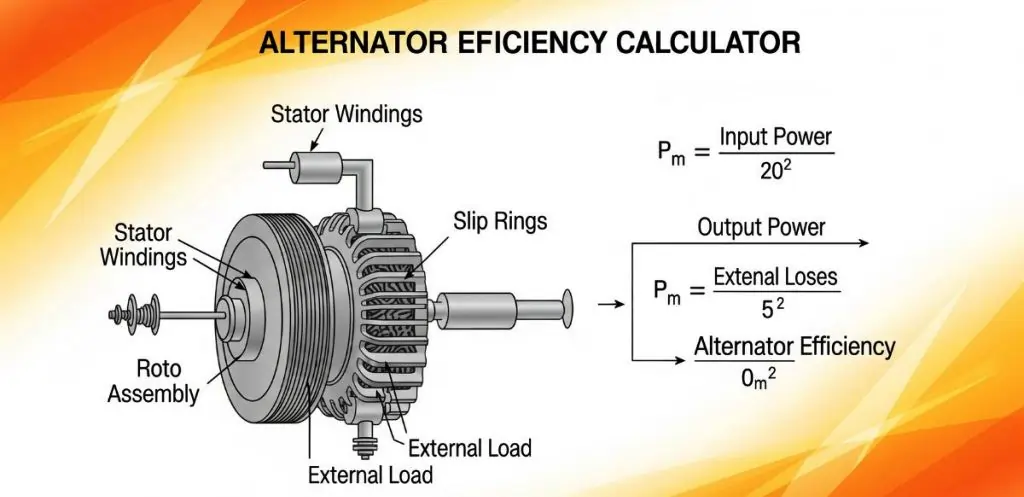Maximize Performance with an Alternator Efficiency Calculator

In automotive, marine, and industrial applications, alternators are critical components—powering everything from engine control systems to lighting and navigation. However, they also consume engine power and generate heat due to inefficiencies. An Alternator Efficiency Calculator helps you understand how well your alternator converts mechanical energy into electrical power—and how much fuel or horsepower is wasted in the process.
🔧 What It Measures
An alternator's efficiency is the ratio of electrical output to mechanical input (from the engine):
Efficiency (η) = (Pₒᵤₜ / Pᵢₙ) × 100%
Where:
- Pₒᵤₜ = Voltage × Current × Power Factor
- Pᵢₙ = Mechanical shaft power (related to engine horsepower)
Losses include:
- Copper windings (I²R losses)
- Core losses (hysteresis, eddy currents)
- Mechanical drag (bearings, windage)
- Diode bridge and fan resistance
Typical automotive alternator efficiency ranges 70–80%, but can drop at high RPM due to increased fan drag.
🚗 Why Use an Efficiency Calculator?
- Fuel Economy & Emissions
Every extra horsepower drawn by the alternator equates to higher fuel burn. Electronics manufacturers like Delco Remy offer fuel economy tools to show how more efficient alternators can save up to 28% in fuel cost in heavy-duty trucks.
- Performance Impact
Particularly when powering high-current systems (audio, refrigeration, navigation), understanding alternator load helps ensure your engine meets peak output requirements without strain.
- System Sizing & Maintenance
Calculators assist in choosing the right alternator size and identifying inefficiencies due to wear or poor design—ensuring reliable performance under varied conditions.
🧮 Interactive Alternator Efficiency Calculator
Results
Electrical Power Output:
Mechanical Power Input Required:
Equivalent Horsepower Required:
Total Losses:
🧰 Benefits & Best Practices
- Choose the Right Alternator: Match output to expected electrical load—more capacity doesn't always mean better system efficiency.
- Maintain System Health: Worn bearings, inefficient diodes, or voltage regulators reduce efficiency over time.
- Optimize Accessories: Know how high-draw systems (e.g., audio, HVAC) affect fuel use and capacity.
- Fleet Management Insight: For commercial or marine fleets, small efficiency gains per unit compound to big savings across operations.
✅ Final Takeaway
An Alternator Efficiency Calculator is more than a diagnostic tool—it's a strategic instrument. It quantifies hidden costs, helps size systems correctly, and drives decisions in design, maintenance, and fuel economy. Whether you're tuning a performance vehicle, managing a marine generator, or optimizing a trucking fleet, knowing your alternator's real efficiency means smarter, greener, more cost-effective operations.
